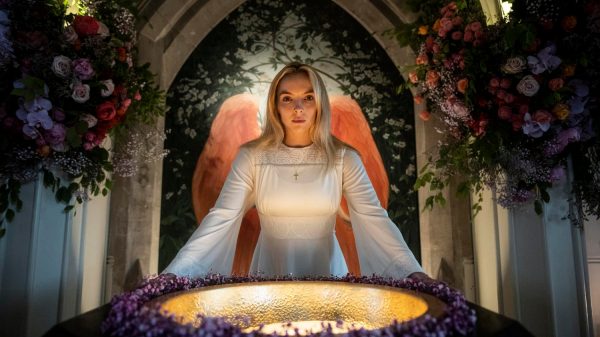It’s only been a couple weeks since Killing Eve ended its four-season run, but fans are still upset over the controversial ending which saw the finale utilize one of the most criticized tropes in film and TV. It’s enough so that Luke Jennings, the creator of Killing Eve and author of the bookseries, has spoken out with his thoughts on the ending. Spoilers for Killing Eve’s finale below…
In the series finale ‘Hello, Losers’, Eve and Villanelle reunite once again and affirm their affections for one another as they track down the members of the mysterious organization The Twelve to a boat sailing on the River Thames. After Villanelle kills them all, her and Eve’s moment of celebration is suddenly cut short as a sniper opens fire on the pair. Villanelle puts herself in the way of Eve and pushes her overboard to protect her before jumping into the Thames herself, however she dies from her several gunshot wounds and her body drifts away from Eve in the Thames’ current, leaving Eve alone in anguish as Eve’s former MI6 boss Carolyn looks on and confirms the assassination in an apparent betrayal to get back into MI6’s graces.
Killing Eve‘s series finale faced criticism for several issues such as the pacing and anti-climax of The Twelve’s defeat, but the biggest by far was Villanelle’s death just as she and Eve were ready to embrace their happiness in the success of their mission after everything they went through in the series. Villanelle’s death fed into the Bury Your Gays trope, where gay and LGBTQ+ characters often end up dying in brutal and tragic ways to cause turmoil to their partner, more often than not just as the characters in the couple commit themselves to their relationship. The criticism against Killing Eve is even stronger considering how much the show became known for defying convention and for the performances of Sandra Oh and Jodie Comer as Eve and Villanelle respectively.
Jennings weighed in on the controversy by offering his own criticism as well as letting fans know Villanelle will be alive and well in the book series and any future novels. “I learned the outcome of the final episode in advance, and suspected, rightly, that fans would be upset. But to those fans, I would say this: Villanelle lives. And on the page, if not on the screen, she will be back,” Jennings said.
Jennings also admitted he thought the series was “bowing to convention” by using Bury Your Gays and said a “truly subversive storyline would have defied the trope which sees same-sex lovers in TV dramas permitted only the most fleeting of relationships before one of them is killed off.”
He continued with recalling what he and Phoebe Waller-Bridge, the creator of the TV series who acted as showrunner for the first season, felt was so compelling about Villanelle. “When Phoebe Waller-Bridge and I first discussed Villanelle’s character five years ago, we agreed that she was defined by what Phoebe called her ‘glory’: her subversiveness, her savage power, her insistence on lovely things. That’s the Villanelle that I wrote, that Phoebe turned into a screen character, and that Jodie ran with so gloriously.”
How do you feel about the Killing Eve finale? Do you agree with Jennings the show fell back on the archaic convention and could have done better? Let us know on our social channels at @flickeringmyth…
After the emotional climax of Season Three, Eve (Golden Globe® winner Sandra Oh), Villanelle (Emmy® Award winner Jodie Comer) and Carolyn (BAFTA winner Fiona Shaw) are in very different places. Following Eve and Villanelle’s exchange on the bridge, Eve is on a revenge mission, while Villanelle has found a brand-new community in an attempt to prove she’s not a “monster.” Having killed Paul, Carolyn goes to extraordinary lengths to continue to chase down The Twelve and the person that ordered Kenny’s hit. This season follows our extraordinary women, each driven by passion, revenge and obsession, building towards a messy, nuanced and totally glorious series finale.
Ricky Church – Follow me on Twitter for more movie news and nerd talk













